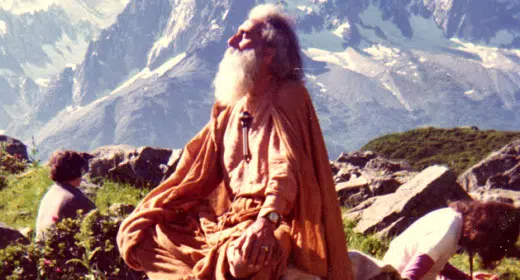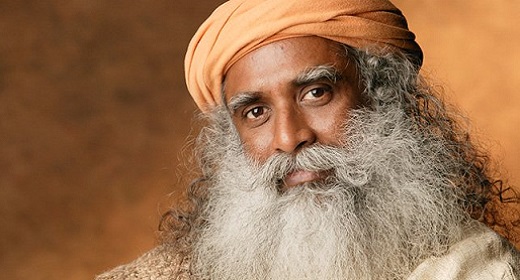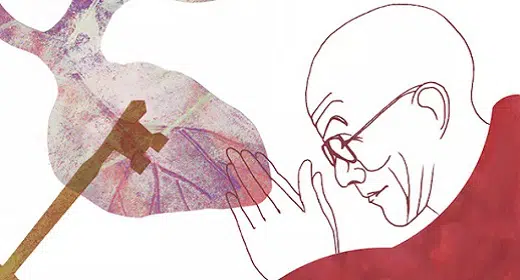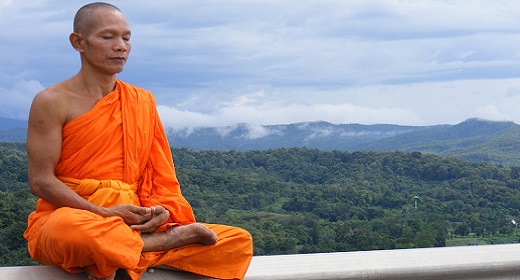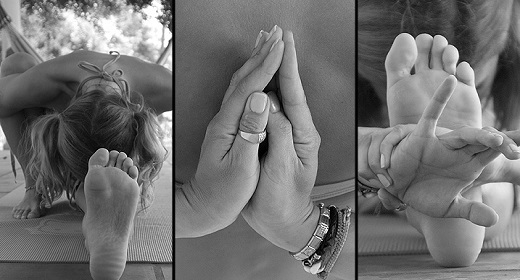by Dalai Lama: “This can make a real difference in our lives…”
I believe that every human being has an innate desire for happiness and does not want to suffer. I believe that each of us has the same potential to develop inner peace and thereby achieve happiness and joy. If one has a positive mental attitude then, even when surrounded by hostility, one will not lack inner peace. On the other hand, if one’s mental attitude is more negative, influenced by fear, suspicion, helplessness, or self-loathing, then, even when surrounded by one’s best friends, in a nice atmosphere and comfortable surroundings, one will not be happy.
In my own case, at the age of 16, I lost my freedom, and at 24, I lost my country. I have been a refugee for the last forty years, with heavy responsibilities. As I look back, my life has not been easy. However, throughout all these years I learned about compassion, about caring for others. This mental attitude has brought me inner strength. One of my favorite prayers, translated roughly, is:
So long as space remains,
So long as sentient beings remain,
I will remain,
In order to help, in order to serve,
In order to make my own contribution.
That sort of thinking has brought purpose to my life. No matter how difficult or complicated things may be, if we have this type of mental attitude we can have inner peace.
Spiritual growth need not be based on religious faith. I believe that the methods by which we increase our altruism, our sense of caring for others, and by which we develop the attitude that our own individual concerns are less important than those of others, are common to all major religious traditions. Though we may find differences in philosophical views and rites, all religions advocate love, compassion, and forgiveness. And even persons who do not believe in religion can appreciate the virtues of basic human values.
Since our very existence and well-being are a result of the cooperation and contributions of countless others, we must have a proper attitude and way of relating to them. In the past, countries, regions, and even villages were economically independent of one another. Under those circumstances the destruction of one’s enemy might have been a victory for oneself. Today we are so interdependent that the concept of war has become outdated. When we face problems or disagreements today, we have to arrive at solutions through dialogue. We cannot destroy our neighbors! We cannot ignore their interests! Doing so would ultimately cause us to suffer.
Non-violence does not mean that we remain indifferent to a problem. On the contrary, it is important to be fully engaged. However, we must do so in a way that does not benefit us alone. We must not harm the interests of others. Non-violence, therefore, is not merely the absence of violence. It involves a sense of compassion and caring. I strongly believe that we must promote non-violence at the level of the family as well as at the national and international levels.
We must try to develop greater perspective, looking at situations from all angles. Usually, when we face problems ,we look at them from our own point of view. We even sometimes deliberately ignore other aspects of a situation. This often leads to negative consequences.
Sometimes, due to a very small matter, a fight starts between a husband and wife, or a parent and child. If you focus merely on the immediate problem, then yes, it really is worth fighting and quarreling. It is even worth divorcing! However, looking at the situation with more perspective, we see that though there is a problem, there is also a common interest. You can come to feel, “This is a small problem which I must solve by dialogue, not by drastic measures.” We can thereby develop a non-violent atmosphere within our own family, as well as within our community.
Another important practice in training our minds involves learning to distinguish between the negative qualities of conceit or arrogance and those of positive pride or self-confidence. In my own practice, when I have an arrogant feeling, “Oh, I’m somehow special,” I say to myself, “I’m a human being and a Buddhist monk. I thereby have a great opportunity to practice the spiritual path leading to Buddhahood.” I then compare myself to a small insect in front of me and think, “This little insect is very weak, with no capacity to think about philosophical matters. It has no ability to develop altruism. In spite of the opportunity I have, I behave in this stupid way.” If I judge myself from this point of view, the insect is definitely more honest and sincere than I am.
Human emotions are very powerful and sometimes overwhelm us. This can lead to disasters. I think that anger and hatred actually cause more harm to us than to the person responsible for our problem. Imagine that your neighbor hates you and is always creating problems for you. If you lose your temper and develop hatred toward him, your digestion will be bad, your sound sleep will go, and you will have to start to use tranquilizers and sleeping pills. You will have to increase the doses of these, which will harm your body. Your mood will be affected, and as a result your old friends will hesitate to visit you. You will gradually have more white hair and wrinkles, and you may eventually develop more serious health problems. Then your neighbor will be really happy. Without having inflicted any physical harm he will have fulfilled his wish!
If, in spite of his injustices, you remain calm, happy, and peaceful, your health will remain strong, you will continue to be joyful, and more friends will come to visit you. Your life will become more successful. This will really bring about worry in your neighbor’s mind. I think that this is the wise way to inflict harm upon your neighbor. You must not consider tolerance and patience to be signs of weakness. I consider them signs of strength.
When we are faced with a person or group of people wishing us harm, we can view this as an opportunity to develop patience and tolerance. We need these qualities; they are useful to us. And the only occasion we have to develop them is when we are challenged by an enemy. So, from this point of view, our enemy is our Guru, our teacher. Irrespective of their motivation, from our point of view they are very beneficial, a blessing.
There is a Buddhist practice where one imagines giving the source of all joy to another person, thereby removing all their suffering. Though of course we cannot change their situation, I do feel that in some cases, through a genuine sense of caring and compassion, through our sharing in their plight, our attitude can help alleviate that person’s suffering, if only mentally. However, the main point of this practice is to increase our inner strength and courage.
I have chosen a few lines that I feel would be acceptable to people of all faiths, and even to those with no spiritual belief. When reading these lines, if you are a religious practitioner, you can reflect upon the divine form that you worship. A Christian can think of Jesus or God; a Muslim can reflect upon Allah. Then, while reciting these verses, make the commitment to enhance your spiritual values. If you are not religious, you can reflect upon the fact that, fundamentally, all beings are equal to you in their wish for happiness and their desire to overcome suffering. Recognizing this, you make a pledge to develop a good heart. It is most important that we have a warm heart. As long as we are part of human society, it is very important to be a kind, warm-hearted person.
May the poor find wealth,
Those weak with sorrow find joy.
May the forlorn find new hope,
Constant happiness and prosperity.
May the frightened cease to be afraid,
And those bound be free.
May the weak find power,
And may their hearts join in friendship


